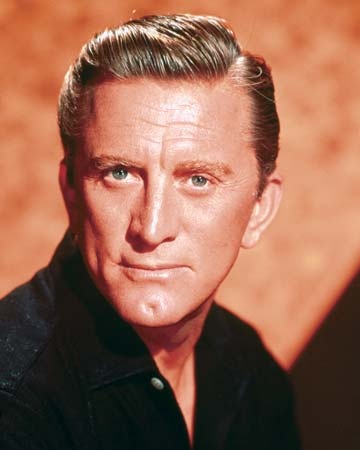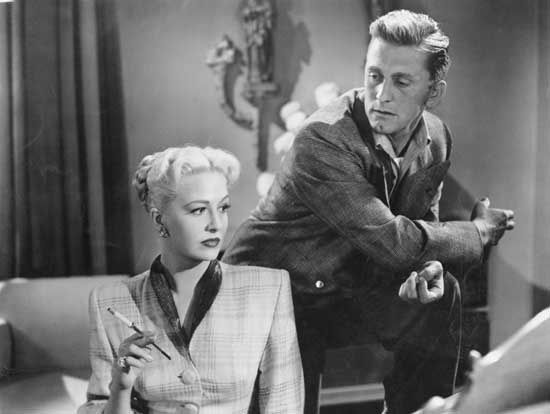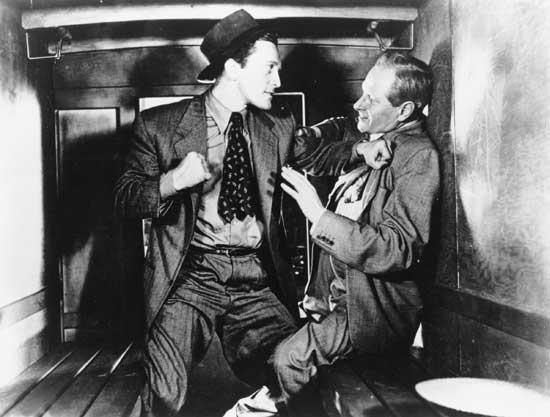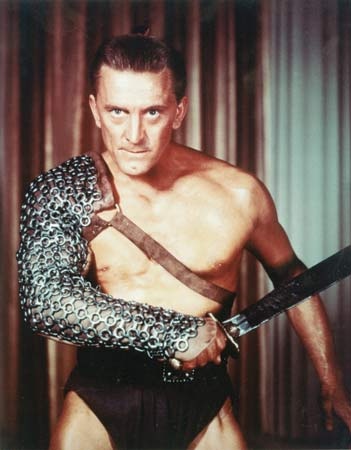Douglas, Kirk
American actor and producer
original name Issur Danielovitch also called Isadore Demsky
born December 9, 1916, Amsterdam, New York, U.S.
 American film actor and producer best known for his portrayals of resolute, emotionally charged heroes and antiheroes.
American film actor and producer best known for his portrayals of resolute, emotionally charged heroes and antiheroes. The son of Russian-Jewish immigrants, Douglas worked as an usher, a bellhop, a waiter, and a professional wrestler while attending St. Lawrence University in Canton, New York (B.A., 1939) and the American Academy of Dramatic Art (1939–41) in New York City. He played mostly minor roles on Broadway before and soon after service in the U.S. Navy (1943–44) and then was drawn to Hollywood. After his first film, The Strange Love of Martha Ivers (1946) with Barbara Stanwyck (Stanwyck, Barbara), Douglas played supporting roles in several notable films, including Out of the Past (1947), Mourning Becomes Electra (1947), and I Walk Alone (1948). He emerged as a star with an Oscar-nominated performance as a ruthless boxer in Champion (1949). In this film, Douglas established a screen persona of a cocky, intense, self-absorbed individual. His on-screen charisma made him an audience favourite despite numerous such roles in which he portrayed men with an abundance of tragic flaws. “I've made a career of playing sons-of-bitches,” he once said.
The son of Russian-Jewish immigrants, Douglas worked as an usher, a bellhop, a waiter, and a professional wrestler while attending St. Lawrence University in Canton, New York (B.A., 1939) and the American Academy of Dramatic Art (1939–41) in New York City. He played mostly minor roles on Broadway before and soon after service in the U.S. Navy (1943–44) and then was drawn to Hollywood. After his first film, The Strange Love of Martha Ivers (1946) with Barbara Stanwyck (Stanwyck, Barbara), Douglas played supporting roles in several notable films, including Out of the Past (1947), Mourning Becomes Electra (1947), and I Walk Alone (1948). He emerged as a star with an Oscar-nominated performance as a ruthless boxer in Champion (1949). In this film, Douglas established a screen persona of a cocky, intense, self-absorbed individual. His on-screen charisma made him an audience favourite despite numerous such roles in which he portrayed men with an abundance of tragic flaws. “I've made a career of playing sons-of-bitches,” he once said. A robust, athletic man with a distinctive, much-imitated voice and a deeply cleft chin, Douglas worked with several renowned directors on some of the most highly regarded films of the 1950s. He portrayed a self-destructive jazz musician, loosely based on cornetist Bix Beiderbecke (Beiderbecke, Bix), in Michael Curtiz (Curtiz, Michael)'s Young Man with a Horn (1950); an unscrupulous reporter who attempts to capitalize on real-life tragedy in Billy Wilder (Wilder, Billy)'s Ace in the Hole (1951, also released as The Big Carnival); a western marshal consumed with guilt over his father's death in Raoul Walsh (Walsh, Raoul)'s Along the Great Divide (1951); a volatile and vengeful cop in William Wyler (Wyler, William)'s Detective Story (1951); and a corrupt motion-picture executive in Vincente Minnelli (Minnelli, Vincente)'s The Bad and the Beautiful (1952), for which Douglas received his second Oscar nomination. One of Douglas's most memorable performances was also one of his most atypical: his intense portrayal of tormented genius Vincent van Gogh (Gogh, Vincent van) in Minnelli's Lust for Life (1956) earned another Oscar nomination.
A robust, athletic man with a distinctive, much-imitated voice and a deeply cleft chin, Douglas worked with several renowned directors on some of the most highly regarded films of the 1950s. He portrayed a self-destructive jazz musician, loosely based on cornetist Bix Beiderbecke (Beiderbecke, Bix), in Michael Curtiz (Curtiz, Michael)'s Young Man with a Horn (1950); an unscrupulous reporter who attempts to capitalize on real-life tragedy in Billy Wilder (Wilder, Billy)'s Ace in the Hole (1951, also released as The Big Carnival); a western marshal consumed with guilt over his father's death in Raoul Walsh (Walsh, Raoul)'s Along the Great Divide (1951); a volatile and vengeful cop in William Wyler (Wyler, William)'s Detective Story (1951); and a corrupt motion-picture executive in Vincente Minnelli (Minnelli, Vincente)'s The Bad and the Beautiful (1952), for which Douglas received his second Oscar nomination. One of Douglas's most memorable performances was also one of his most atypical: his intense portrayal of tormented genius Vincent van Gogh (Gogh, Vincent van) in Minnelli's Lust for Life (1956) earned another Oscar nomination. Douglas maintained his status as a top box-office draw for the next decade with such quality films as Stanley Kubrick (Kubrick, Stanley)'s Paths of Glory (1957) and Spartacus (1960), Gunfight at the O.K. Corral (1957), The Devil's Disciple (1959), Lonely Are the Brave (1962), Seven Days in May (1964), and In Harm's Way (1965). Thereafter, the quality of Douglas's films declined, although he remained highly active, averaging at least one film per year until the late 1980s. The better films of his later career include The Brotherhood (1968), There Was a Crooked Man (1970), The Fury (1978), The Man from Snowy River (1982), and Tough Guys (1986), Douglas's seventh and last film with his close friend Burt Lancaster (Lancaster, Burt). Douglas also directed two films, the ill-conceived pirate comedy Scalawag (1973), and the cynical western adventure Posse (1975), which has become a cult favourite.
Douglas maintained his status as a top box-office draw for the next decade with such quality films as Stanley Kubrick (Kubrick, Stanley)'s Paths of Glory (1957) and Spartacus (1960), Gunfight at the O.K. Corral (1957), The Devil's Disciple (1959), Lonely Are the Brave (1962), Seven Days in May (1964), and In Harm's Way (1965). Thereafter, the quality of Douglas's films declined, although he remained highly active, averaging at least one film per year until the late 1980s. The better films of his later career include The Brotherhood (1968), There Was a Crooked Man (1970), The Fury (1978), The Man from Snowy River (1982), and Tough Guys (1986), Douglas's seventh and last film with his close friend Burt Lancaster (Lancaster, Burt). Douglas also directed two films, the ill-conceived pirate comedy Scalawag (1973), and the cynical western adventure Posse (1975), which has become a cult favourite.Douglas is the author of a well-received autobiography, The Ragman's Son (1989), and of two best-selling novels, Dance with the Devil (1990) and The Gift (1992). He suffered a life-threatening stroke in 1995, but, befitting his scrappy image, he was back on screen four years later to portray the leading role in the comedy Diamonds (1999). Douglas received a Life Achievement Award from the American Film Institute in 1991 and an honorary Academy Award in 1996.
Additional Reading
Tony Thomas, The Films of Kirk Douglas (1972, reissued 1991); Diana Douglas Darrid, In the Wings: A Memoir (1999).
- Elis
- Elisabeth Antoinette Irwin
- Elisabeth Bergner
- Elisabeth Domitien
- Elisabeth Förster-Nietzsche
- Elisabeth Luther Cary
- Elisabeth Marbury
- Elisabeth Schumann
- Elisabeth Vigée-Lebrun
- Elisabet Ney
- Elisha
- Elisha ben Abuyah
- Elisha Graves Otis
- Elisha Gray
- Elisha Kent Kane
- Elisha Rice Reed: General Lee at Gettysburg
- elision
- Elista
- Eli Terry
- Eli Whitney
- elixir
- Elizabeth
- Elizabethan literature
- Elizabeth Anne Chase Akers Allen
- Elizabeth Arden